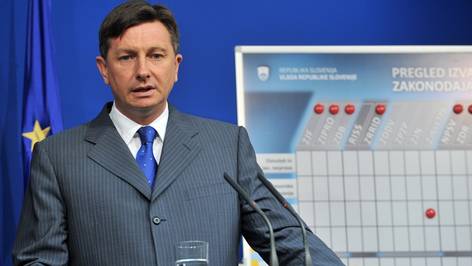NEWS
Prime Minister's press conference held after the Government’s 127th regular session
At today’s 127th regular session, the Government of the Republic of Slovenia adopted several resolutions, including wording of the Slovenian News Agency Act. The responsible minister presented the major emphases from the Act and Prime Minister Pahor answered some topical questions of the press.
The ministerial corps adopted the proposed draft of Slovenian News Agency Act whose main objective is to regulate the operation and organisation of STA in accordance with EU rules on transparent funding of public service activities, i.e. with state aid rules. Another objective was definition of STA as a public service entity and its separation from the market activities in accordance with EU and national law. Such regulation ensures transparent and stable funding and constitutes the basis for editorial and managerial independence. In addition, the said Act has retained the existing legal entity status form of STA as a company, since no justified reasons exist due to which transformation of STA into some other legal entity status would be necessary. The new Act through the provisions governing appointment of the responsible editor and of other editors strengthens the autonomy of journalists’ and editors’ work.
In addition, Prime Minister Pahor and director of the Institute for Macroeconomic Analysis and Development (IMAD) presented the main conclusions of the spring economic trends forecast prepared by the Institute. According to expectations, Slovenia is to have a 2,2% economic growth this year, while next year that figure is to be 2,6%. Also in future, the key growth factor will be exports, but not to the extent that this was in the past. The structure of Slovenian exports has changed and, as a result, exports will no longer constitute such an encouragement to growth as this used to be in the past. This year, an important factor of growth will be domestic consumption of goods along with the expected revival of investments. Prime Minister Pahor said that Slovenian economy is on the path to recovery; however, this could be faster depending on a more expeditious adoption of the cost-cutting and other structural reforms aimed at the promotion of competitiveness. »In this context we can be relatively optimistic about the future«, said Pahor and pointed out that »the destiny of the country to a great extent, but not entirely, depends on ourselves«.
Concerning his conduct in the case of State Secretary Horvat, Prime Minister Pahor expressed satisfaction with the fact that the Commission for the Prevention of Corruption judged Mr Horvat’s attitude with the Commission as an exemplary one. On this occasion, he reiterated that on grounds of the Commission's recommendation, Mr Andrej Horvat would no longer assume any task relating to the implementation of the Pomurje Act. »I find this right and fair, both with regard to the taxpayers and to himself«, stressed Prime Minister Pahor. Accordingly, Mr Horvat will be free to perform all other tasks relating to regional policy. In addition, Prime Minister Pahor was pleased to know that Mr Horvat accepted his invitation to remain in the post of State secretary in his Office. In his answer to an additional question on why he suggested Mr Zoran Thaler to resign from the post of the European Parliament member, while Mr Horvat was to keep the post of State Secretary, the Prime Minister said that he acted in full compliance with the anti-corruption commission recommendations which did not recommend his resignation, but only his withdrawal from the entire Pomurje project.
Regarding the case of deputy Luka Juri, Prime Minister noted that the mentioned deputy failed to act correctly when he joked about the possibility of eventual bribery. »There are too many problems like this to joke about them«, said the Prime Minister and warned that all those likely to succumb to bribery should report such cases to competent authorities or else be held co-responsible for them.
With regard to recapitalisation of Nova Ljubljanska banka (NLB), Prime Minister Pahor considered it useful for Slovenia to remain the owner of the NLB 25% + one share, at appropriate time and in an appropriate manner, so that the recapitalisation burden would be transferred on foreign investors. He further stressed that he made no pressure on Minister Križanič to proceed to such scenario already at present, due, in particular, to low share prices and »in order to avoid the accusations of having sold a bank only on the pretext of saving State deficit, although recapitalisation would be carried out on the basis of balance sheet B«. He added that it was not his wish »to endlessly listen to objections – based, on one hand, on relatively convincing and, on the other hand, relatively unconvincing ground that NLB played a crucial role in the financial system rehabilitation during recession«.




